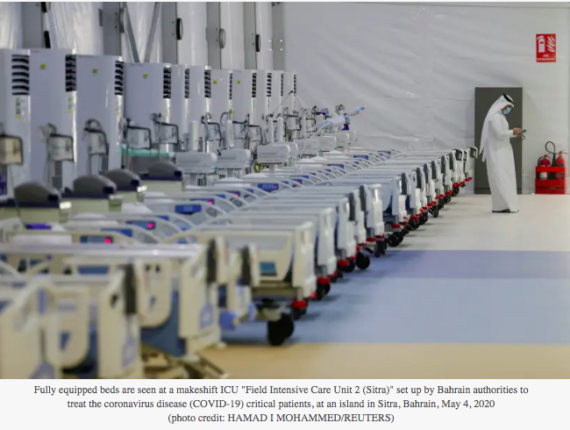
The Jerusalem Post
By Lahav Harkov
May 10, 2020
Talk of cooperation with Gulf states on fighting coronavirus comes after years of closer ties between Israel and those countries.

Three Gulf states have reached out to Israel in recent weeks to receive information and assistance in the fight against the novel coronavirus known as COVID-19. The three make up half of the countries that are members of the Gulf Cooperation Council (GCC).
Bahrain and another Gulf state reached out to Sheba Medical Center at Tel Hashomer, expressing interest in the hospital’s response to the pandemic, and the United Arab Emirates’ ambassador to the United Nations said publicly that her government would be willing to work with Israel on a vaccine.
“I have heard leaders in the Gulf say over and over, ‘with our resources and wealth and Israeli innovation, we can create a vaccine and a cure’…They have seen this pandemic as an opportunity for cooperation between themselves and Israel,” said Rabbi Marc Schneier, who has extensive ties in the Persian Gulf as president of the interfaith dialogue organization Foundation for Ethnic Understanding. “There’s an opportunity to join forces here. So many issues transcend politics in the Middle East.”
Schneier and Yoel Hareven, director of Sheba’s International Division, said that Bahrain and another Gulf state, which they declined to name, have taken an interest in telemedicine or remote medicine innovations in Israel and the ways Israel has responded to the coronavirus pandemic.
“We offered them any help they need, even if it’s connecting doctors or nurses, or sending teams to them, sharing logistical knowledge,” Hareven said. “Whatever help we can give our neighbors – we will do it happily.”
Hareven said the unnamed country is “central and different” in the Gulf and is “not one we’re used to hearing about,” and that Israel is not known to have ties with it, which is why they are keeping a low profile.
“There are a lot of things happening above and below the surface,” Hareven said, noting that the governments in that region are very centralized, which means the contact with Sheba took place with the leaders’ approval. “They believe very strongly in the connection with Israeli medicine and Israel generally.”
Copyright © 2025 Foundation For Ethnic Understanding. All rights reserved. | Privacy Policy